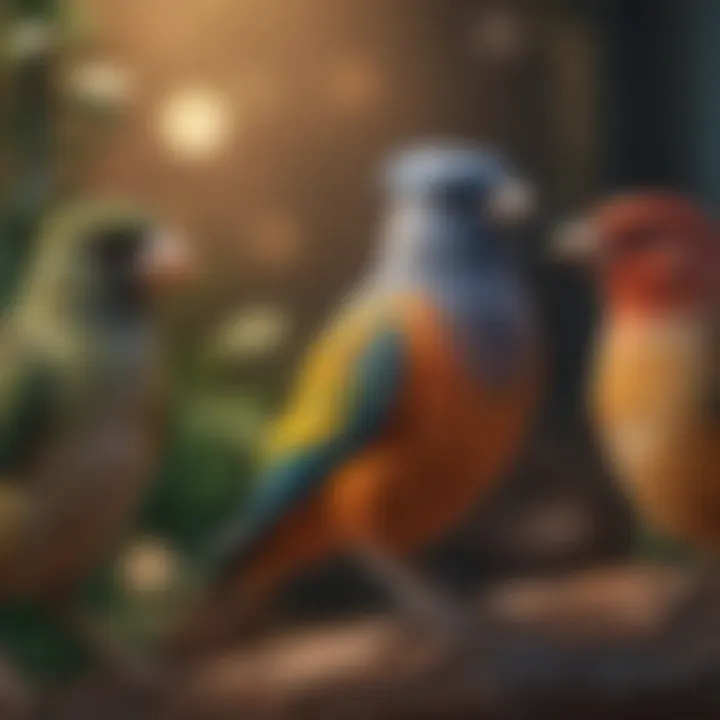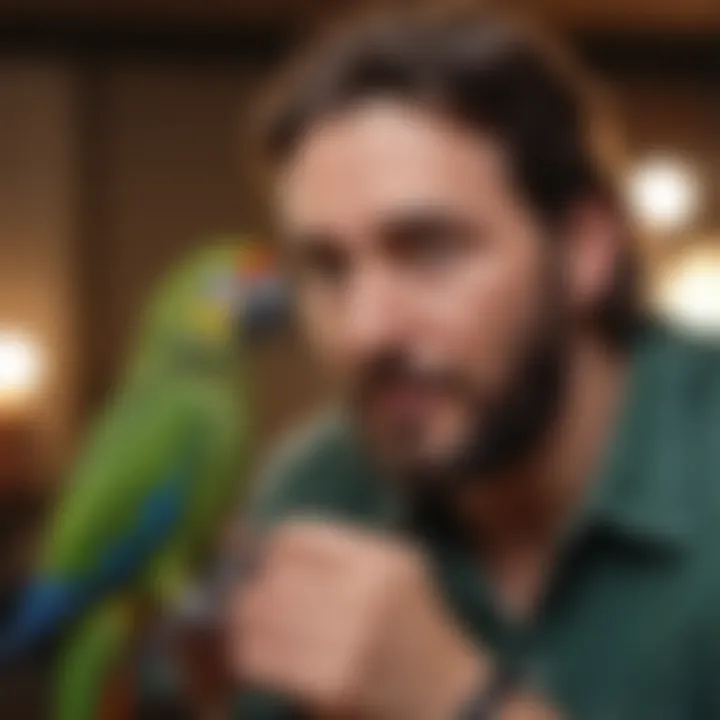Understanding Domestic Birds: Care and Insights


Intro
Domestic birds are fascinating creatures, serving as both companions and subjects of considerable interest. They are defined as bird species that have been selectively bred and adapted for life alongside humans. This interaction has a rich history and contributes significantly to their behavioral traits and care needs. Understanding these aspects is crucial for current or prospective bird owners.
Bird keeping has evolved over generations. Historically, some bird species were domesticated for their utility, such as for food or pest control, while others have been valued for their beauty or companionship. Today, pet bird ownership has become a significantly popular trend. It is essential not just to appreciate their beauty but also to understand their specific needs and behaviors.
By exploring various species, their care requirements, and behavioral traits, bird owners can create a more comfortable and healthy environment for these animals. This article will guide you through the central elements you need to know, from proper care techniques and nutrition, to behavioral insights and wellness practices.
Care Tips
Taking care of a domestic bird goes beyond just providing food and water. A consistent daily routine can enhance a bird's health and happiness. Here are key aspects to consider:
Daily Care Routines
Regular routines include feeding, cleaning the cage, and social interaction. Provide fresh food and water daily and ensure that your bird gets enough out-of-cage time. Interacting with your bird enhances their social skills and your bond.
Cage Setup and Maintenance
A suitable cage is fundamental. The cage should be spacious enough for the bird to move around. Use natural perches and avoid plastic materials. Regular maintenance is essential, including the cleaning of perches and toys.
Hygiene and Cleaning Practices
Hygiene is critical for preventing health issues. Clean the cage weekly and change the bedding regularly. Bird droppings should be cleaned daily to maintain a healthy environment.
Seasonal Care Adjustments
Birds may require different care depending on the season. In winter, ensure that they are kept in a warm environment. During summer, watch for signs of overheating, ensuring they have access to shade and water.
Behavioral Insights
Understanding your pet’s behavior aids in creating an enriching environment. Observing body language is particularly useful in deciphering your bird's feelings.
Understanding Bird Body Language
Birds express their feelings through various body postures and movements. A relaxed bird generally has settled feathers and a calm demeanor. Watch for signs like flapping wings or raised feathers, indicating stress or excitement.
Common Behavioral Issues and Solutions
Common issues include biting, screaming, or feather plucking. Identify triggers for these behaviors and address them through modification techniques.
Positive Reinforcement Techniques
Training through positive reinforcement helps build trust. Rewarding your bird for desired behaviors encourages them to repeat those actions.
Social Interaction Needs
Birds are social creatures and require interaction. Spend time daily with them or consider getting a companion bird to ensure they remain stimulated and socialized.
Nutrition Guides
A well-balanced diet is pivotal for a bird’s health. Understanding their dietary needs prevents health issues and promotes longevity.
Essential Diet Components
Seeds should not be the sole diet. Include vegetables and fruits to provide necessary vitamins. A pelleted diet can also ensure a balanced intake.
Safe and Toxic Foods
Be cautious with food choices. Foods like chocolate, avocado, and caffeine can be toxic to birds. Consult reliable sources for a comprehensive list of safe and toxic foods.
Supplements and Treats
Occasional treats are welcome, but they should not comprise the primary diet. Consider supplements if your bird does not receive well-rounded nutrition from food alone.
Feeding Strategies for Different Species
Different birds have different needs. Research the specific dietary requirements of your bird's species to tailor their meals effectively.
Wellness and Health
Maintaining a bird’s health involves routine check-ups and awareness of common illnesses.
Routine Health Checkups
Regular check-ups with an avian veterinarian are essential. They can identify health issues before they become severe.
Identifying Symptoms of Illness
Watch for changes in appetite, droppings, or behavior, as these may indicate a health issue. Early identification aids in prompt treatment.
Preventative Care and Vaccinations


Preventative care ensures birds remain healthy. Vaccinations may be necessary depending on your bird’s species and living conditions.
Mental and Emotional Well-being
Mental stimulation is vital. Provide toys and activities to keep your bird engaged. Ignoring their emotional needs can lead to behavioral issues.
Enriching Activities
Engaging activities are crucial in enhancing your bird’s life quality. Such activities prevent boredom and promote mental health.
Toys and Playtime Ideas
Rotate toys regularly to maintain interest. Provide a variety of options, from chewable to puzzle toys, to stimulate different aspects of their personality.
Training and Tricks
Teaching your bird tricks can enhance your bond. Start with simple commands and gradually introduce new ones as your bird masters each skill.
Outdoor Activities and Interaction
Supervised outdoor time allows birds to explore natural environments. Exposure to fresh air and natural sunlight is beneficial. Use aviaries for safe outdoor interaction.
DIY Projects for Mental Stimulation
Homemade toys can be fun and cost-effective. Simple items like paper towel rolls can be transformed into engaging toys.
Defining Domestic Birds
Understanding what domestic birds are lays the foundation for comprehending their role in our lives and the responsibilities that come with caring for them. Domestic birds serve as companions, sources of joy, and, in certain cultures, symbols of tradition and continuity. The significance of defining domestic birds correctly cannot be overstated—it allows owners and potential bird parents to make informed choices about the species they wish to welcome into their homes.
What are Domestic Birds?
Domestic birds refer to species that have been bred and adapted over time for companionship or utility. Unlike their wild counterparts, domestic birds exhibit traits that are more amenable to living alongside humans. They often display tamer behaviors and are more adaptable to human environments. Common types of domestic birds include parrots, canaries, and finches. Each of these species has unique characteristics, making them suited to a variety of lifestyles and preferences.
To clarify the distinction, domestic birds are typically bred in captivity, and their socialization is facilitated through consistent interaction with humans. This aspect is vital since it shapes behaviors and could lead to a fulfilling relationship with their owners.
Classification of Domestic Birds
The classification of domestic birds is essential for understanding the various types available to potential pet owners. Broadly categorized, domestic birds can be divided into several groups based on various criteria, including their family, care requirements, and behavioral characteristics. This classification helps in identifying the best fit for individuals seeking to adopt a bird.
Here are the primary classifications:
- Parrots and Parakeets: These birds are known for their intelligence and social behavior. Species like the African Grey Parrot and Budgerigar are popular choices among bird enthusiasts.
- Canaries and Finches: Typically kept for their song or aesthetic appeal, these birds are less demanding but still require attentive care.
- Doves and Pigeons: Known for their gentle nature, these birds can also be kept as pets and have a deep-rooted connection to various cultures around the world.
Understanding these classifications allows bird owners to make informed decisions about the types of birds they consider adopting. Notably, a clear grasp of what constitutes domestic birds facilitates better care practices and enriches the overall experience of bird ownership.
"The right understanding and awareness can significantly enhance the life quality of domestic birds and their relationship with humans."
Historical Context
The historical context surrounding domestic birds is crucial to understanding their role in our lives today. The domestication of birds spans thousands of years, with notable implications on agriculture, companionship, and culture. Understanding this past provides insight into the traits and behaviors of various species, enabling better care and appreciation.
The Domestication Process
The process of domestication involves selective breeding and adaptation of wild species to serve human needs. Many domestic birds, such as parrots and canaries, have origins in wild counterparts. For example, the budgerigar is a result of selective breeding from larger parakeets. The domestication process impacts behavior, physical appearance, and even vocalization.
It has provided humans with companionship, food, and entertainment.
Historically, bird keeping began not only as a source of food, but as a fascination with their beauty and songs. The act of keeping birds in captivity can be traced back to ancient civilizations. Egyptians were known to keep birds for companionship and symbolism, while in China, bird keeping was integrated deeply into culture and social practices. Through this process, humans developed relationships with various bird species, leading to their role as beloved pets in many households today.
Cultural Significance of Birds
Birds have played a vital role in various cultures throughout history. They serve as symbols of freedom, beauty, and communication across many societies. From Greek mythology to modern folklore, birds often embody messages or omens. The cultural significance extends into art, literature, and rituals.
For pet owners today, acknowledging this cultural backdrop can offer a richer understanding of their relationship with birds. It encourages responsible ownership and appreciation for their specific needs and behaviors.
"Birds are a reminder of nature's beauty and complexity, connecting us to history and culture in profound ways."
The impact of cultural significance is evident in the various festivals or events dedicated to birds in several communities. These activities highlight the importance society places on their presence, reinforcing their role not merely as pets but as companions enriched by their history.
In summary, the historical context provides vital insights into why domestic birds are so cherished. Understanding the domestication process and the cultural significance can enhance the experience of bird ownership. It allows us to appreciate not just their beauty and companionship but also their rich history and the responsibility that comes with caring for them.
Common Species of Domestic Birds
Domestic birds are a popular choice among pet lovers for various reasons including their vibrant colors, charming personalities, and intelligence. Understanding the common species of domestic birds is crucial for potential bird owners. Each species has unique care needs, behaviors, and characteristics that can greatly influence the owner’s experience and the bird's well-being. By familiarizing oneself with these species, owners can make informed decisions when selecting a pet bird. This section aims to highlight the most recognized domestic birds, offering insights into their behavior, care requirements, and social nature.
"Choosing the right species can define the entire experience of bird ownership; knowledge is key to a fulfilling companionship."
Parakeets and Budgerigars
Parakeets, specifically budgerigars, are among the most popular pet birds. They are small, colorful, and relatively easy to care for. Budgerigars are sociable and naturally inquisitive, making them an ideal choice for first-time bird owners. Due to their friendly nature, they thrive in pairs or small groups. Providing a spacious cage and ample toys enhances their well-being. Additionally, they require a balanced diet of seeds and fresh vegetables to maintain good health. Regular social interaction is essential, as it can prevent behavioral issues.
Cockatiels
Cockatiels are another favored choice among domestic birds. Known for their distinctive crests and charming whistles, they possess a friendly temperament. These birds can develop strong bonds with their owners and often enjoy being handled. Providing them with a stimulating environment, such as perches, toys, and safe space for flight, is important. Their diet should include high-quality pellets, seeds, and fruits. Cockatiels also require regular opportunities for socialization and interaction with their human companions, ensuring they remain happy and healthy.


Lovebirds
Lovebirds are small, affectionate birds known for their vibrant colors and playful personalities. They thrive on social interaction, and their name reflects their tendency to form strong pairs. When kept alone, they can become lonely or distressed. A proper cage setup with interactive toys and a variety of perches is crucial for their happiness. Nutrition should consist of a mix of seeds, fresh fruits, and vegetables. Owners must pay attention to their social needs, engaging them in daily play and bonding activities to enhance their quality of life.
Canaries and Finches
Canaries and finches are known for their singing abilities and vibrant colors. They are relatively low-maintenance birds, making them suitable for individuals who appreciate beauty and song but may have less time for social interaction. Canaries, especially, are admired for their melodious songs. A well-structured cage filled with appropriate nesting materials and perches is significant for their comfort. Their diet primarily comprises seeds, but including greens and fruits can provide additional nutrients. Minimal handling is required, but they should still receive attention to ensure social stimulation.
African Grey Parrots
African Grey Parrots are considered one of the most intelligent bird species, known for their exceptional talking abilities. They are large birds but can develop strong, affectionate bonds with their owners. Their social needs are considerable, requiring regular interaction and mental stimulation. This species thrives on varied diets, including high-quality pellets, nuts, fruits, and vegetables. Adequate space, along with toys that promote brain engagement, is vital for their development. Owners must invest time in training and bonding, as this enriches the lives of these parrots immensely.
Care Requirements
Caring for domestic birds is an essential aspect of ensuring their health and happiness. Proper care requirements encompass various elements that include housing, dietary needs, and social interactions. These factors significantly contribute to both the physical and mental well-being of birds. A well-cared-for bird is likely to exhibit positive behaviors and a longer lifespan, making it vital for bird owners to prioritize these needs.
Housing and Environment
The environment in which domestic birds live plays a pivotal role in their quality of life. Birds need spacious, clean cages that allow for movement and comfort. Here are some key considerations:
- Cage Size: The cage must be large enough for the bird to stretch its wings and move around freely. Different species require varying cage sizes. For instance, an African Grey Parrot will need a larger space compared to a finch.
- Escape Proof: Ensure that the cage is secure. Birds are skilled at escaping, and an inadequate cage could lead to accidents or loss.
- Placement: Position the cage in an area that is part of the family activity without being too noisy. Avoid areas with drafts or direct sunlight.
- Cleaning: Regularly clean the cage to prevent odors and maintain hygiene. Use bird-safe cleaning products.
In addition to a good cage, providing perches and toys is crucial. These items keep birds mentally engaged and physically active. Consider natural wood perches or various textures, adjusting their placement for variety that encourages exploring.
Diet and Nutrition
Nutrition is another cornerstone of bird care. A balanced diet not only promotes physical health but also supports mental well-being. Here are the major components:
- Seeds and Pellets: These should be the common staples of a bird's diet. However, look for high-quality options that contain essential vitamins and minerals.
- Fresh Fruits and Vegetables: Introduce fresh produce into their diet regularly. Leafy greens, berries, and carrots are often favorites among birds.
- Water: Always provide fresh, clean water. Change it daily to maintain cleanliness and avoid bacterial growth.
- Treats: While treats can be enjoyable for birds, they should be limited to avoid obesity. Use them sparingly and as positive reinforcement.
Bird owners should be aware of specific dietary needs for each species, as some birds have unique requirements. Consulting with a veterinarian or avian specialist is often beneficial to tailor diet accordingly.
Important Reminder: Changes in diet should be gradual. Sudden shifts may lead to stomach issues or refusal to eat.
Overall, paying attention to both housing and diet creates a solid foundation for a healthy, thriving domestic bird, ensuring a fulfilling experience for both the bird and owner.
Behavioral Insights
Understanding the behavioral insights of domestic birds is paramount for their care and well-being. This section aims to delve into various aspects of bird behavior, how it affects their quality of life, and the implications for bird owners. A comprehensive grasp of these insights fosters a better environment for birds, leading to improved health and happiness. Bird owners can thus engage in more informed decisions about housing, diet, and social interactions, which ultimately results in a more harmonious living situation for both birds and their caretakers.
Understanding Bird Behavior
Birds possess unique behaviors shaped by their instincts and environment. Recognizing these behaviors is crucial for any bird owner. Several important aspects include:
- Social Interactions: Birds are inherently social animals. They thrive on interactions, whether with their human companions or with other birds. Engaging with them daily helps strengthen this bond and enhances their emotional health.
- Cognition: Many species exhibit high levels of intelligence. African Grey Parrots, for example, can learn words and phrases, showing understanding of context. Observing how they respond to their environment gives insights into their cognitive capabilities.
- Playful Nature: Birds often engage in playful behavior, which is vital for mental stimulation. Providing toys and safe enrichment activities can keep them engaged and prevent boredom.
To maximize well-being, owners should observe typical behaviors. Knowing when a bird behaves normally or deviates can be critical in identifying health issues or stress.
Signs of Stress and Well-being
Birds display various signs that indicate their health, mood, and general well-being. Understanding these signs is vital for fostering a caring environment. Typical indicators include:
Signs of Well-being:
- Vocalization: A happy bird often chirps or sings. These sounds are expressions of comfort and contentment.
- Active Behavior: Birds that are well-adjusted display curiosity and engage with their environment.
- Preening: Regular, thorough preening indicates a comfortable bird. It helps them maintain cleanliness and can also be a sign of self-acceptance.
Signs of Stress:
- Feather Plucking: Over-grooming can signal anxiety or boredom. Immediate attention may be needed to address this behavior.
- Aggression or Withdrawal: A bird acting defensively or isolating itself could be experiencing stress.
- Change in Eating Habits: A drastic alteration in feeding patterns might be indicative of underlying issues, either emotional or physical.
"Observing these behaviors closely allows caregivers to respond effectively, ensuring their birds live healthy and fulfilling lives."
Providing a supportive and understanding environment significantly reduces stressors, leading to a more content and active bird. The knowledge of behavioral insights not only enriches the lives of birds but also fosters a more rewarding relationship between pet and owner. By becoming attuned to their needs and behaviors, bird owners can significantly enhance the quality of life for their feathered companions.
Socialization and Interaction
Socialization and interaction are pivotal aspects of keeping domestic birds, playing a key role in their mental and emotional well-being. Engaging with these creatures goes beyond mere companionship; it creates a foundation for strong bonds. Birds are social animals, often requiring interaction not just with their owners but also with other birds. Understanding the dynamics of this socialization is essential for fostering a happy and healthy environment.
The Importance of Bonding
Bonding with your bird facilitates trust and helps alleviate stress for both the pet and the owner. Trust builds a sense of security, which is crucial for a bird’s mental health. Birds that are well-bonded with their owners tend to be more social, less fearful, and more willing to explore their surroundings.
- Establishing a bond can begin from the moment you bring a bird home. Spending time each day talking to and gently handling your bird is essential. This creates familiarity, which is comforting.
- You can enhance bonding through positive reinforcement. Rewards like treats make interactions enjoyable. This can be in form of their favorite snacks or praise.
The strength of this bond is reflected in the behavior of the bird. A well-bonded bird often engages in playful activities, vocalizes more, and shows curiosity about their environment. This relationship not only enriches their lives but also enhances your experiences as a bird owner.
Enriching Activities
Birds require more than just a cage and food; they need stimulation to thrive. Enriching activities keep their minds active and mitigate behavioral issues like boredom or excessive vocalization.
Here are some effective enriching activities:
- Toys: Rotating toys regularly keeps the environment fresh. Toys can encourage foraging, climbing, and problem-solving.
- Interaction: Schedule playtime outside the cage. Use a safe, bird-proofed area for this. It allows the bird to explore and interact with you in a different setting.
- Training: Teaching tricks not only stimulates the bird but also strengthens your bond. Birds enjoy engaging their minds, and training offers mental challenges.
- Social Interaction: If you have multiple birds, allow them to interact. They can provide companionship to each other, fulfilling their social needs.
- Environmental Enrichment: Changing the layout of their cage can provide new perspectives. Adding branches, perches, and hiding places creates opportunities to explore.


"Regular interaction and engagement can lead to a more harmonious life for you and your birds."
Incorporating these activities ensures your bird remains mentally healthy and emotionally balanced. The right environment fosters not only individual happiness but also strengthens the owner-bird relationship.
By understanding and implementing these socialization techniques, you can create a fulfilling lifestyle for your pet bird, enhancing both their quality of life and your bond.
Ethical Considerations
In today’s pet ownership landscape, it is increasingly important to address the ethical considerations surrounding domestic birds. Understanding the responsibilities connected with caring for these creatures not only benefits the birds but also enhances the experience for their human companions. The welfare of domestic birds is a reflection of how society values these animals and their role within the human environment.
Caring for birds goes beyond merely providing shelter and food; it involves ensuring their physical, mental, and social well-being. This aspect of ethical ownership includes adherence to welfare standards and a commitment to providing a conducive environment that encourages natural behavior. Such actions have lasting benefits, ranging from improved health outcomes for the birds to deeper bonds between them and their owners.
It is crucial for potential bird owners to consider the implications of their decisions, particularly when acquiring birds, whether through purchase or adoption. Making ethical choices lays the foundation for fulfilling relationships and a harmonious environment for both parties.
Welfare Standards
Welfare standards are guidelines that determine the quality of life for domestic birds. These standards take into account space, nutrition, socialization, and environmental enrichment. For instance, birds require sufficient space to move and engage in their natural behaviors. Cages must be of appropriate size, allowing for flight and exploration.
"Proper care practices contribute to the long-term well-being of domestic birds, ensuring they thrive both physically and emotionally."
Common welfare standards include:
- Housing Requirements: Ensure cages are spacious and designed for the specific species, allowing for flight and exploration.
- Nutritional Needs: Provide a balanced diet tailored to the species, incorporating seeds, fruits, vegetables, and supplements as required.
- Social Interaction: Birds are social creatures; they should have opportunities to interact with their owners and, when suitable, other birds.
- Mental Stimulation: Enrichment activities are essential. Toys, foraging opportunities, and safe items to chew on can help keep birds engaged and mentally healthy.
By adhering to established welfare standards, owners not only fulfill ethical obligations but also foster a thriving environment where birds can flourish.
Rescue and Adoption
The conversation around ethical bird ownership often leads to the subject of rescue and adoption. Many domestic birds find themselves in shelters due to abandonment, neglect, or changes in their owner's circumstances. Choosing to adopt a bird can have significant positive implications, both for the individual bird and for the broader community.
Adopting from a rescue organization or shelter not only provides a needy bird with a safe and loving home, but it also helps combat the overpopulation of birds in these establishments and reduces the demand for commercial breeding.
Some important factors about rescue and adoption include:
- Assessment: Potential adopters should work with shelters to match with birds that fit their lifestyles and experience levels.
- Commitment: Bringing a bird into your home is a long-term commitment. Understanding their care needs and potential behavioral challenges is vital.
- Educational Opportunities: By adopting, owners often learn more about bird behavior and welfare, deepening their knowledge and appreciation.
Engaging in rescue and adoption not only saves lives but also raises awareness about the issues that many domestic birds face. The ethical implications of choosing to rescue emphasize the responsibility that comes with bird ownership.
Communication and Language
In the realm of domestic birds, understanding communication and language is crucial for fostering a healthy relationship between the bird and its owner. Unlike typical pets such as cats or dogs that rely heavily on physical cues, birds communicate through a variety of sounds and body language. This understanding not only enhances the bond between the bird and its caretaker but also allows for better overall care and observational skills.
Understanding Bird Sounds
Birds utilize a range of sounds to express their emotions and needs. Each species has its own unique vocalizations, making it essential to recognize these sounds to interpret their feelings accurately. For example, a budgerigar may chirp softly when content or issue loud calls when startled or seeking attention.
Listening closely to your bird’s vocal behavior can help you discern patterns. Consider the following aspects regarding bird sounds:
- Frequency of Sounds: Frequent, high-pitched sounds might indicate happiness or excitement.
- Volume: A loud scream can signify stress or discomfort, while quieter sounds may suggest contentment.
- Duration: Extended calls may be a call for social interaction or an indication of distress.
By paying attention to these parameters, a bird owner can better respond to their bird's needs and improve its overall wellbeing.
Interpreting Body Language
Body language in birds conveys a plethora of information about their mood and health. Unlike sounds, body language combines physical posture and movement, making it an integral part of avian communication.
Several key indicators can help owners assess their birds' conditions:
- Feather Position: Ruffled feathers may suggest a bird is distressed or chilly, while smooth, well-groomed feathers indicate comfort and good health.
- Head Position: A bird that tilts its head towards you typically seeks attention or interaction, whereas a bird that keeps its head low may be feeling threatened.
- Foot Movement: A bird that grips its perch firmly is likely feeling secure, while a bird that hops around restlessly may exhibit signs of anxiety or unease.
By observing these subtle cues, bird owners can recognize stress signs or simply enjoy the nuances of their bird's emotional states.
Understanding these forms of communication is not just a matter of curiosity; it enhances the interaction between birds and their caregivers, fostering a trusting and healthy environment.
Resources for Bird Owners
Bird ownership brings joy, but it also comes with responsibility. Having the right resources is crucial for any bird owner. Resources can greatly enhance the experience of being a bird parent. They provide information that improves care, welfare, and comprehension of your bird’s needs. Knowledge is power when it comes to ensuring your feathered friend lives a happy, healthy life.
Access to reliable guides and communities can help new owners avoid common pitfalls. While books offer structured information, online platforms provide real-time advice and support. Therefore, combining both can lead to a well-rounded understanding of bird care.
Information is essential for responsible bird ownership. Having access to good resources can change the quality of care you provide.
Books and Guides
Books about bird care cover various essential topics that every bird owner should understand. They provide insights into species-specific needs, behavioral characteristics, and proper care routines. Here are a few key areas that these resources usually explore:
- Species Information: Detailed descriptions of specific breeds, their histories, and unique traits.
- Care Guidelines: Step-by-step instructions on housing, diet, and health monitoring.
- Behavioral Understanding: How to interpret common behaviors and signs of distress.
- Training Techniques: Methods to train and engage your bird positively.
Some well-regarded books include "The Complete Handbook of Cockatiels" and "The Parrot Who Thought She Was a Dog". These texts not only offer comprehensive care information but also highlight the bond that can develop between birds and their owners.
Online Communities and Forums
Online platforms provide a dynamic space for bird owners to share experiences and advice. Websites like Reddit and Facebook host numerous groups focused on bird care. These communities offer several benefits:
- Peer Support: Engaging with other owners allows you to learn from their experiences.
- Immediate Answers: Quick responses to urgent questions can be lifesaving.
- Shared Resources: Members often share valuable resources, including guides, vet recommendations, and tips.
Popular subreddits such as r/parrots or r/birds cater specifically to avian enthusiasts. Being part of these forums can help mitigate the isolation often felt by new bird owners. Ultimately, this collaborative environment fosters better care practices and enriches the lives of the birds.
In summary, the combination of books and online communities equips bird owners with the knowledge they need. They provide answers and build connections that enhance the overall bird ownership experience. The journey of bird parenting can be both rewarding and educational.















